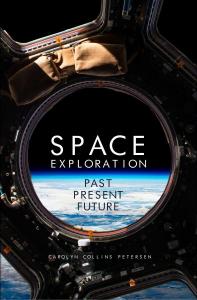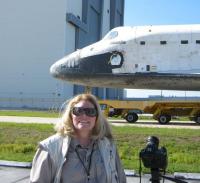Carolyn Collins Petersen, Space Exploration
For this column, NASW book editor Lynne Lamberg asks NASW authors to tell how they came up with the idea for their book, developed a proposal, found an agent and publisher, funded and conducted research, and put the book together. She also asks what they wish they had known before they began working on their book, what they might do differently the next time, and what tips they can offer aspiring authors. She then edits the A part of that Q&A to produce the author reports you see here.
Publication of NASW members’ reports in Advance Copy does not constitute NASW’s endorsement of their books. NASW welcomes your comments, and hopes this column stimulates productive discussions.
Space Exploration: Past, Present, Future
Carolyn Collins Petersen
Amberley Books, April 1, 2018, $26.95
ISBN-10: 1445656035; ISBN-13: 978-1445656038
Petersen reports:
This book came from a conversation I had with an acquisitions editor from Amberley Books who had seen my books on Amazon. The company publishes books on aircraft, trains, and ships, and wanted to expand into space vehicles and exploration. The editor tracked me down to initiate an offer.
I suggested the book answer the question, "What does it take to create a space-faring species? I wanted to examine not only science and technology advances but also focus on the people who have done the work to build and run the spacecraft, devise the science, and guide the missions. Their ideas, and their paychecks benefit society in many ways, from purchasing power to taxes, education, and so on. It was my way of showing that resources spent on space exploration benefit people and institutions here on Earth. I developed an outline, which the publisher accepted.
A large part of the “human story” also comprises the laws, educational structures required to create a technological basis for the space age, and the effects of space exploration on art, music, and entertainment. My book rolls it all into 11 chapters and includes a peek into the future.About 90 percent of my research did not end up in the book specifically, but I needed it to write what is there. I read numerous background books, did extensive online research, and talked to key people. It’s all useful because background is important. The book took about a year to write, which, for the length of the book, 110,000 words, was a good amount of time. I knew some of the material quite well, but other areas–such as the Chinese space program–were a bit of a black hole to explore.
The result is an executive summary or “quick look” at a complex topic, written for the reader who wants to know more about space age issues. Because space is a dynamic subject, I will periodically send the publisher corrections and updates to include in subsequent printings.
Contact info:
- Carolyn Collins Petersen, 303 642 7250, cc.petersen@gmail.com, @spacewriter
- Book website: https://www.lochnessproductions.com/books/books.html
- Blog: www.thespacewriter.com/wp
- Publicity: Hazel Kayes, +44 (0)1453 847813, H.Kayes@amberley-books.com
NASW members: will your book be published soon? Take advantage of this opportunity for shameless self-promotion. Submit your report for Advance Copy.
Tell your fellow NASW members how you came up with the idea for your book, developed a proposal, found an agent and publisher, funded and conducted research, and put the book together. Include what you wish you had known before you began working on your book, or had done differently.
See https://www.nasw.org/advance-copy-submission-guidelines.
Thinking of writing a book? If you are a NASW member, you may access a list of more than 150 books and online resources to help you craft your book proposal, find an agent and funding sources, negotiate your contract, learn about self-publishing, publicize and market your book, and more at https://www.nasw.org/article/write-book.
Send book info and questions about book publishing to Lynne Lamberg, NASW book editor, llamberg@nasw.org.


